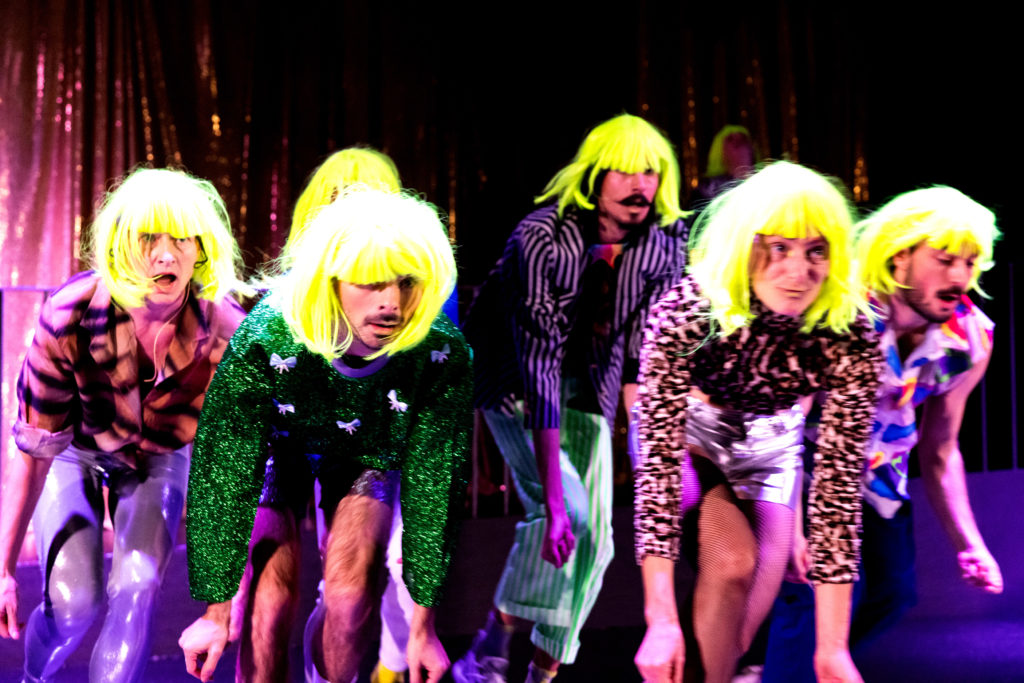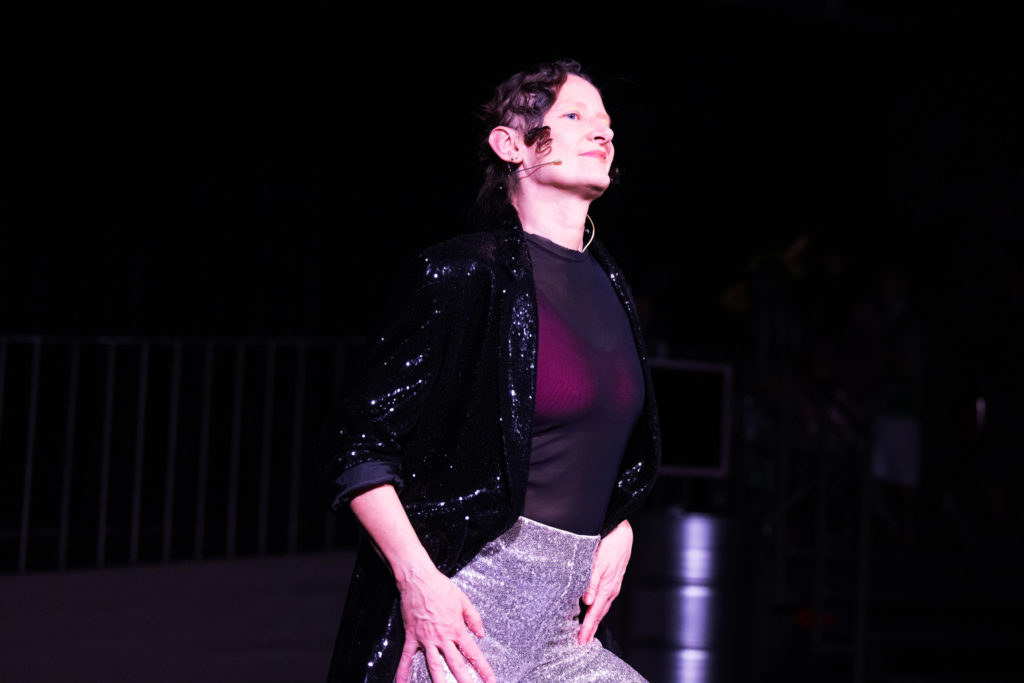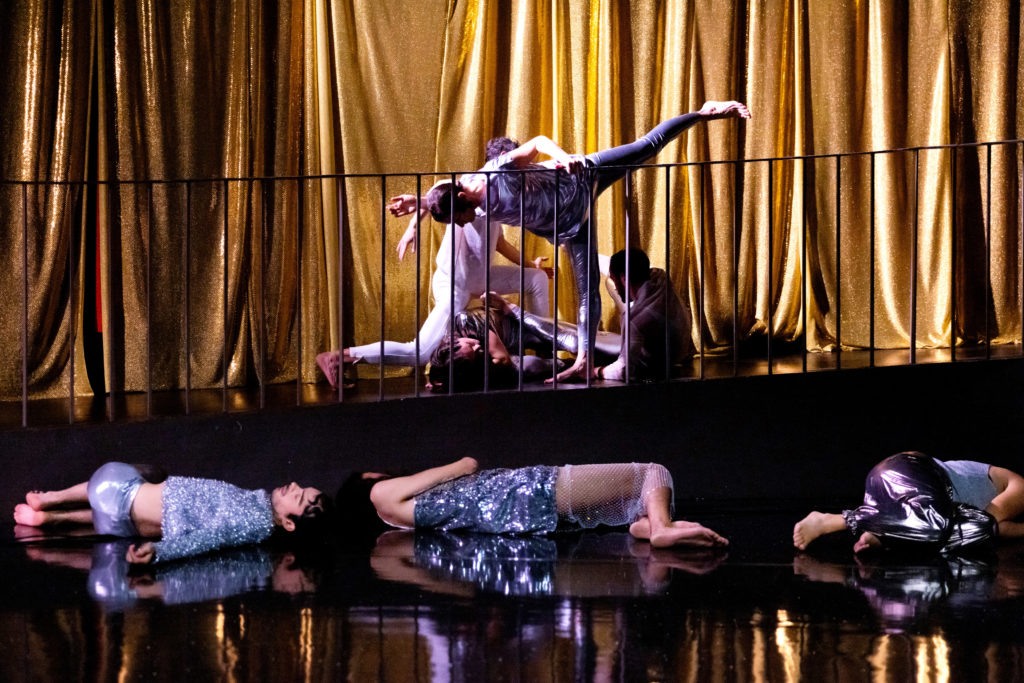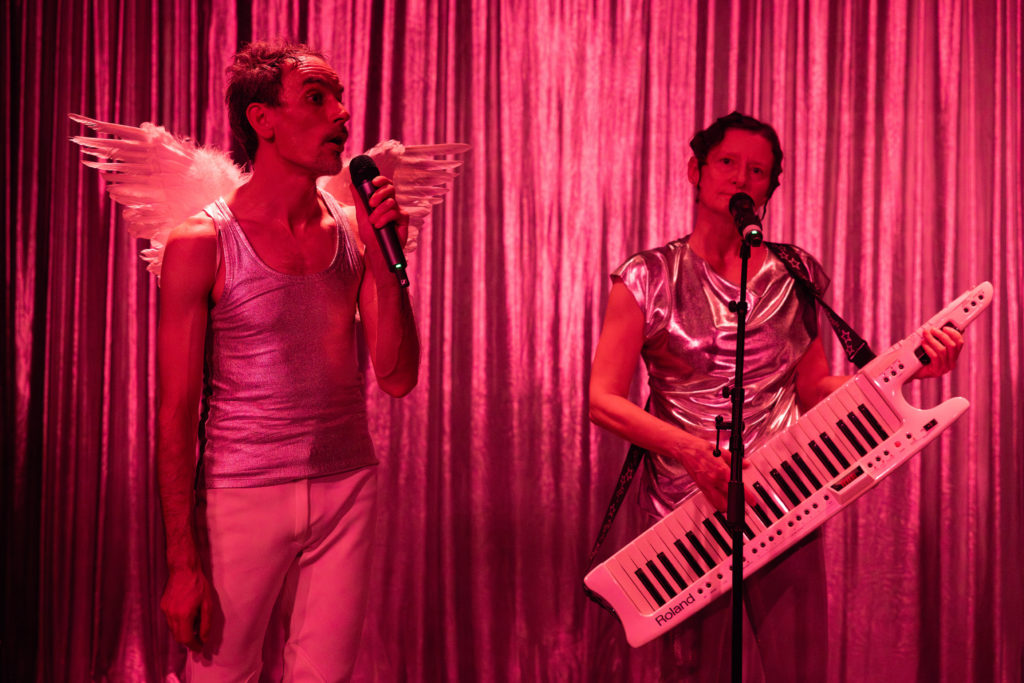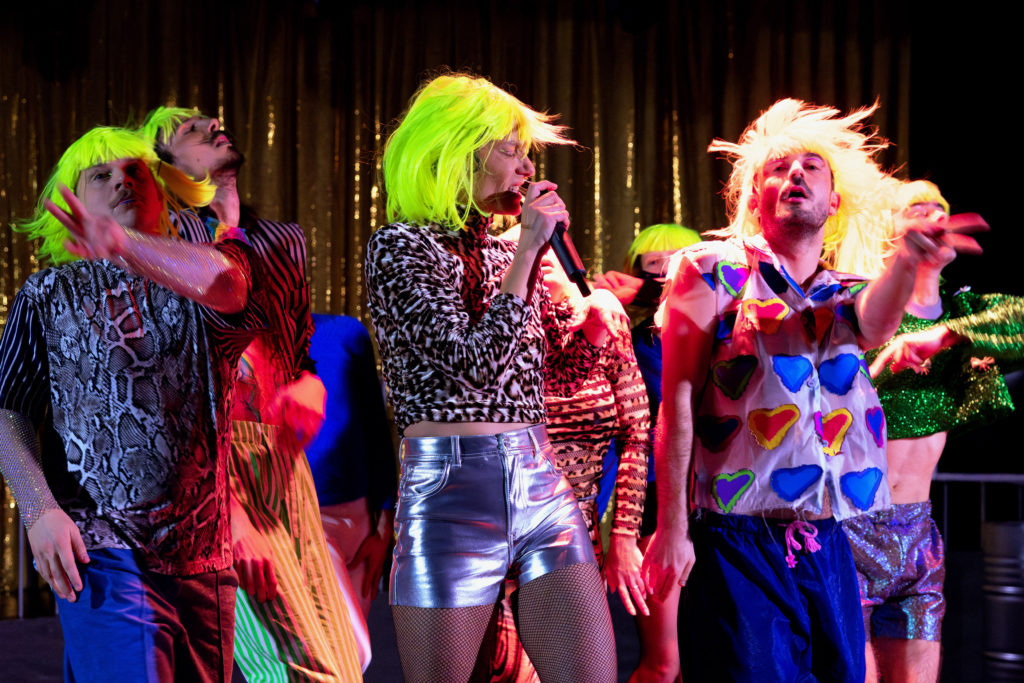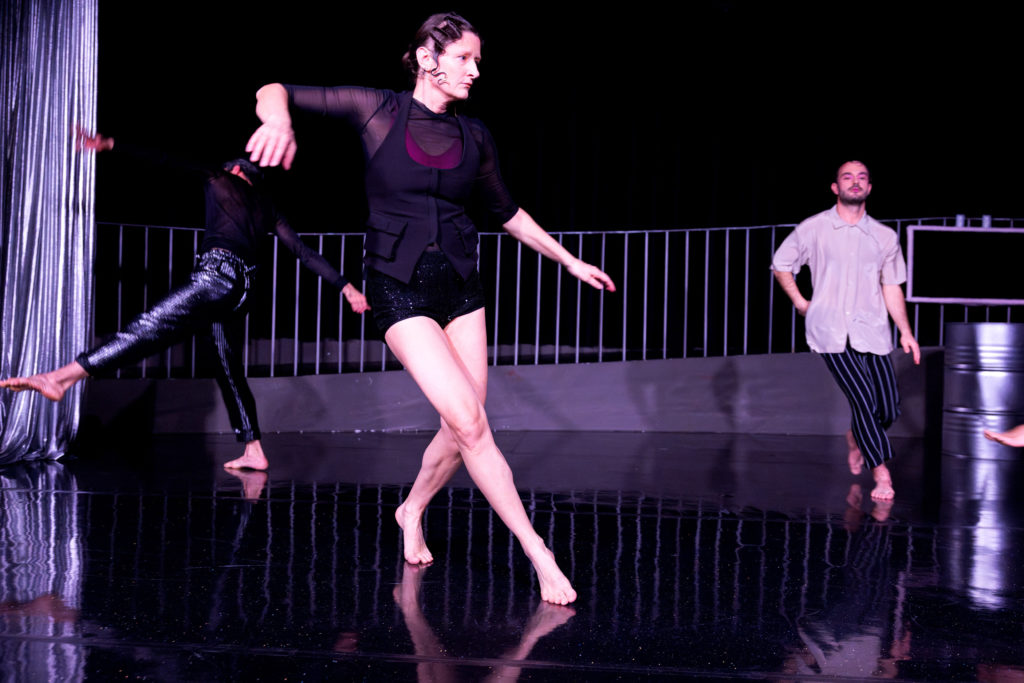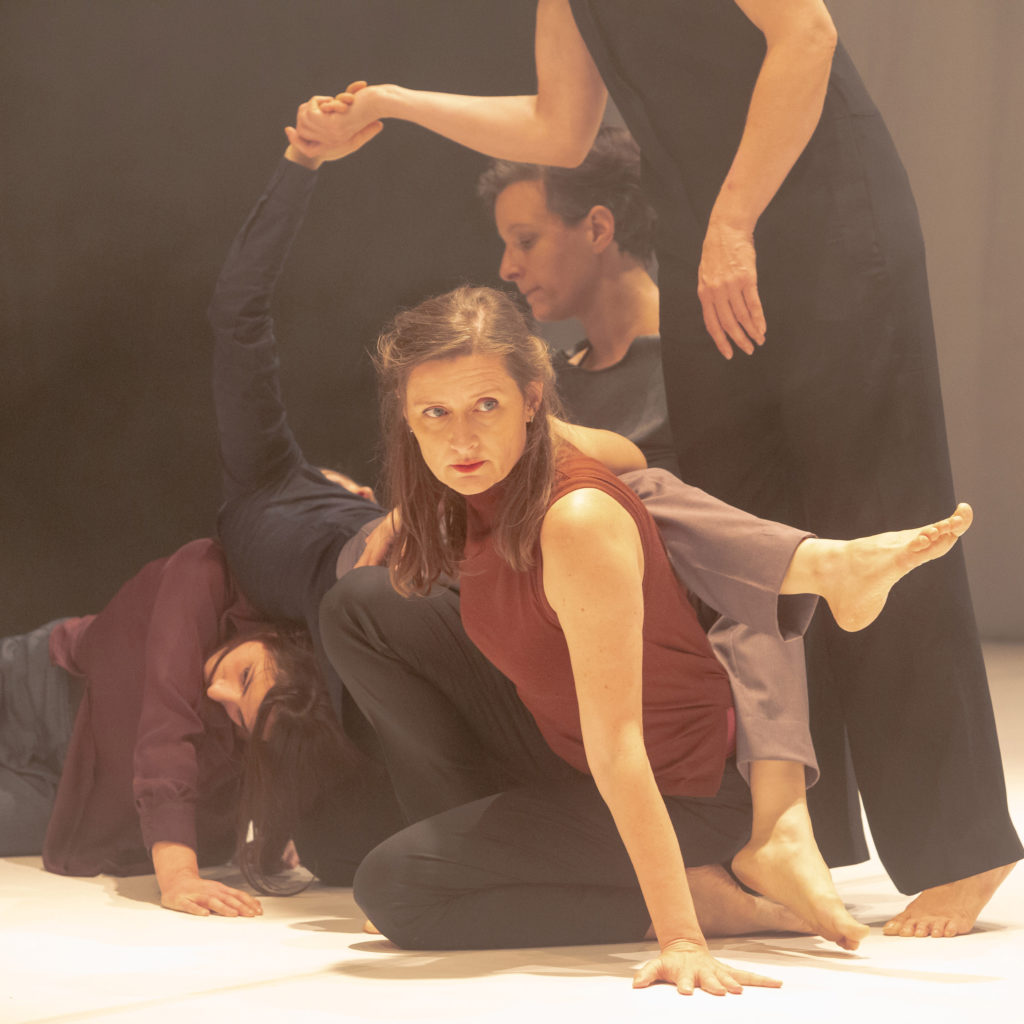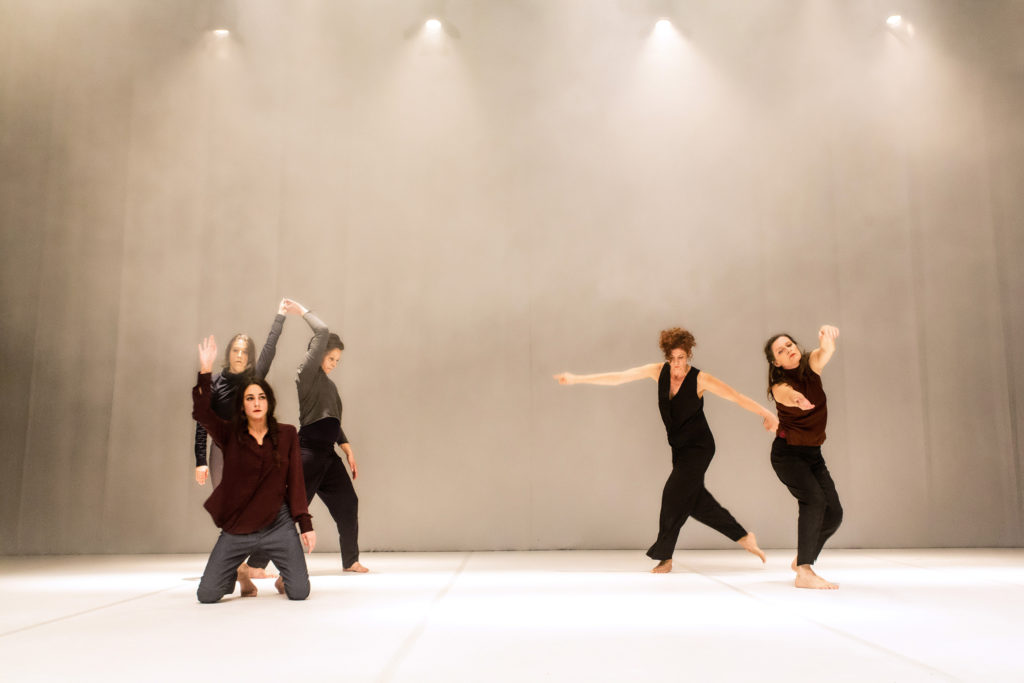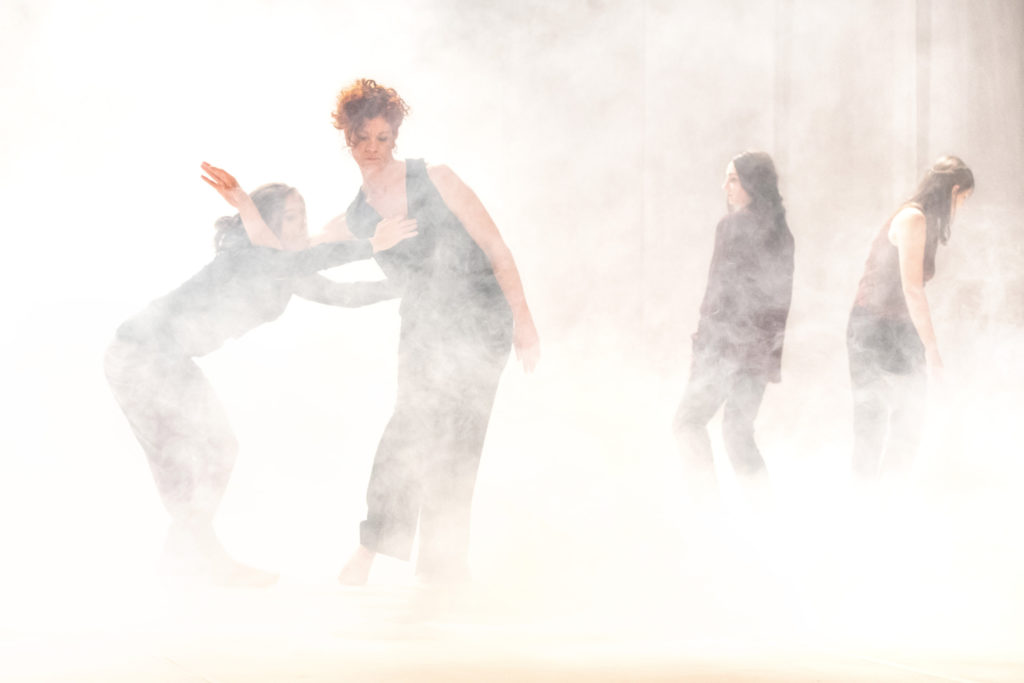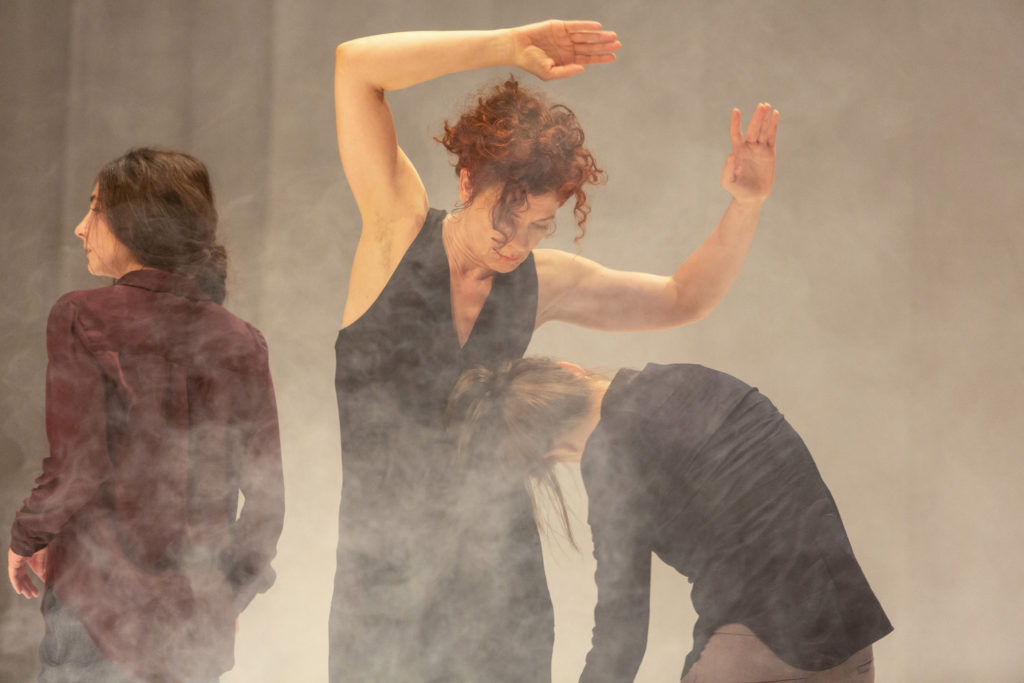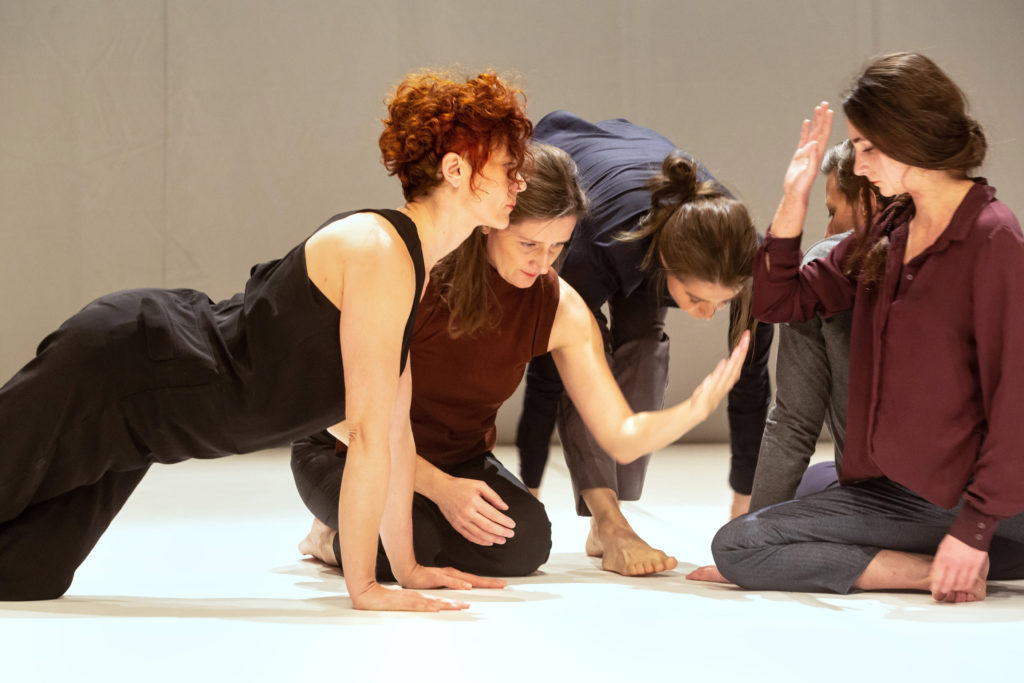
Technoburlesque is a mute comedy of the body that mocks rigidity of social roles. It uncritically appropriates, copies and glues together femininity, masculinity, family relationships, machismo and other degenerated social roles that are unrighteous considered to be normative. When Image Snatchers totally expose themselves — and remove their social dresses layer by layer — they do not find the essence, but realize that the essence is nothingness, and the performed travesties opium that makes living bearable. This amusing play in cross-dressing and their behavior are a result of great sexual and bodily liberation from social bands. Satisfied in eclectic noise of media images they stretch popular snap-shots and bite them to their unheard-of forms that provoke burst of laughter or despair. Image Snatchers don’t seek for meaning but pleasure. As pleasure is the hedonistic polish with which they smeared everyday objects and made something exceptional out of them. Technoburlesque is an intersection of (program/cybernetic) code and subjectivity; a laying bare of the physical and emotional body indivisibly bound up with the information matrix of contemporaneity.
“I am riddled with ambivalence. I am both the rule and its exception, the law and its outcast, the doctor and the hysteric, I cannot be one without the other. I do not reject the images that consume me. I become them.” (Mady Schutzman)
Creators and performers:
The Feminalz: Crucial Pink, Mad Jakale, Mathilde Buns, Tristan Bargeld, H.P.D. (hormonal perturbator in decay), Cica-San, Rosa Dolores, Rebellious Controversy, Poppy Hopps, Dee Dee Void, Ariela, GlitterAid, Musée-Cunt, Belinda, Frau Strapatz, Gospod Magdalenca, RotoGambrinus, Mademoiselle Satisfaire, Vazelina, Številka Ena, Boccaccio
Guests: Liberty Brokeheart, Aphra Tesla Operating System, Shiva the Godess of Gandja, Maud Otis, Virgin Mary, Freddie Cankar, Mama Mila, Anja Bezlova
Costume design: Urška Recer, Matic Hrovat, Tanja Pađan/Kiss the Future
Make-up and hair design: Tina Prpar
Selection of the music and original tracks: Luka Prinčič and The Feminalz
Light design: Janko Oven, Aljaž Zaletel, Urška Vohar, Dan Zrimšek
Video: The Feminalz and Luka Prinčič
Texts: Saša Rakef, Frau Strapatz, Ariela, Dee Dee Void, Gospod Magdalenca and Feminalz
Design: Saša Kerkoš
Production: Emanat
In collaboration: Klub Gromka, Maska, Kino Šiška, Slovensko mladinsko gledališče
Thanks: Projekt Atol
Financially supported: Ministry of Culture RS, City of Ljubljana
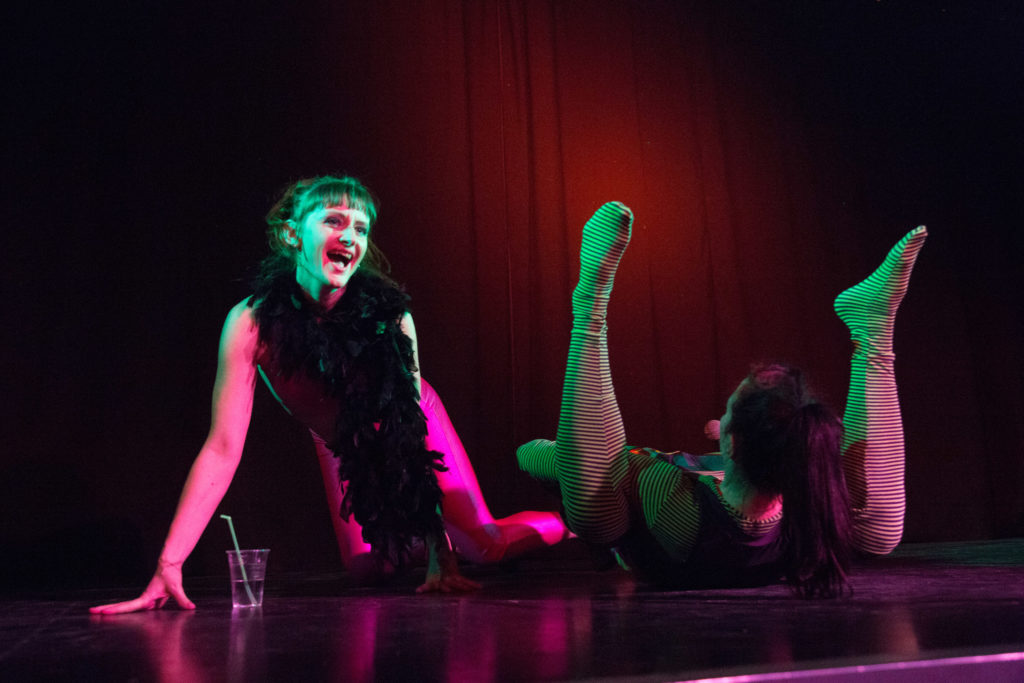

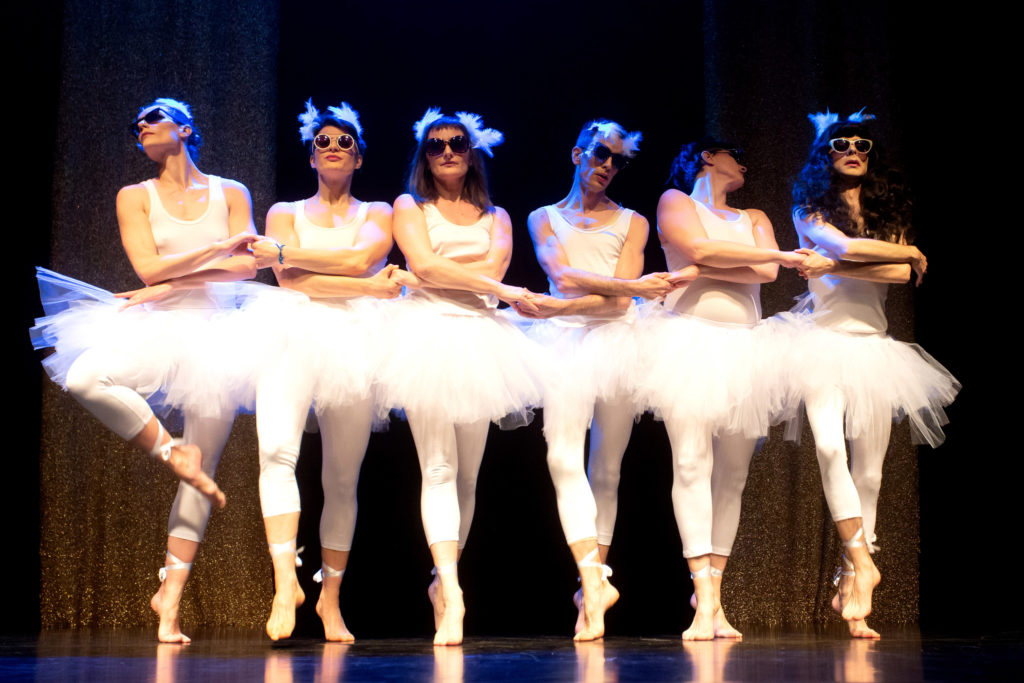
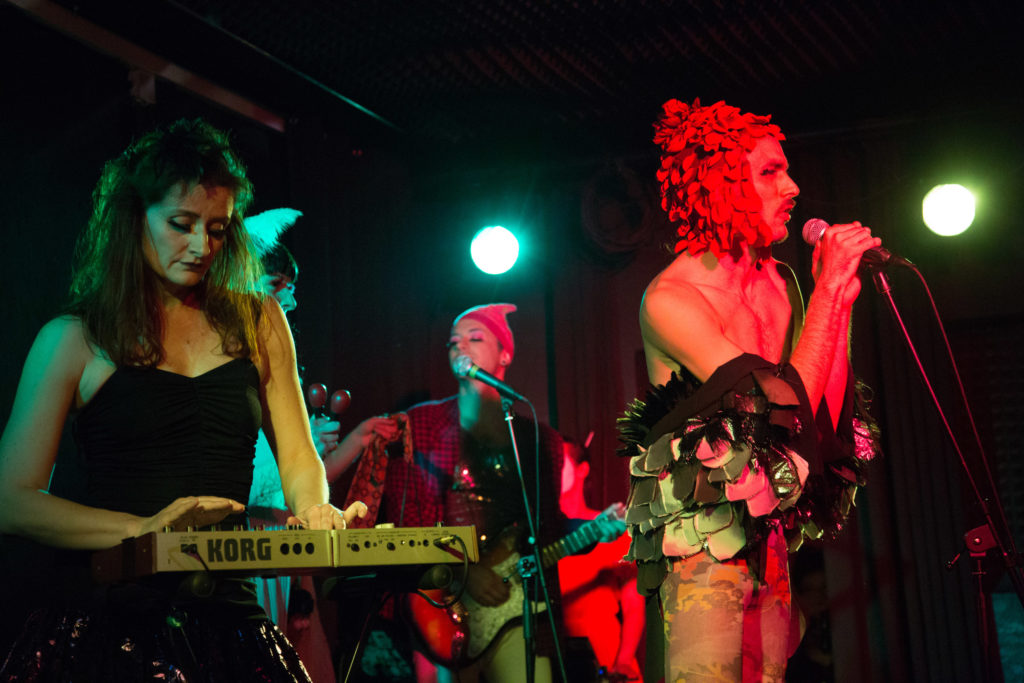

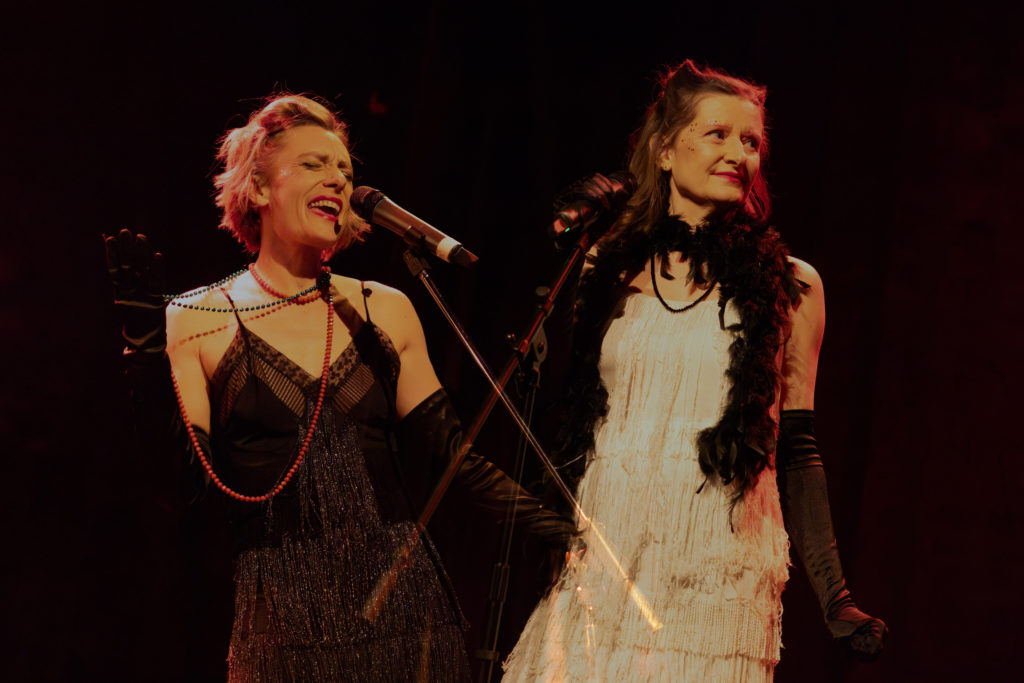
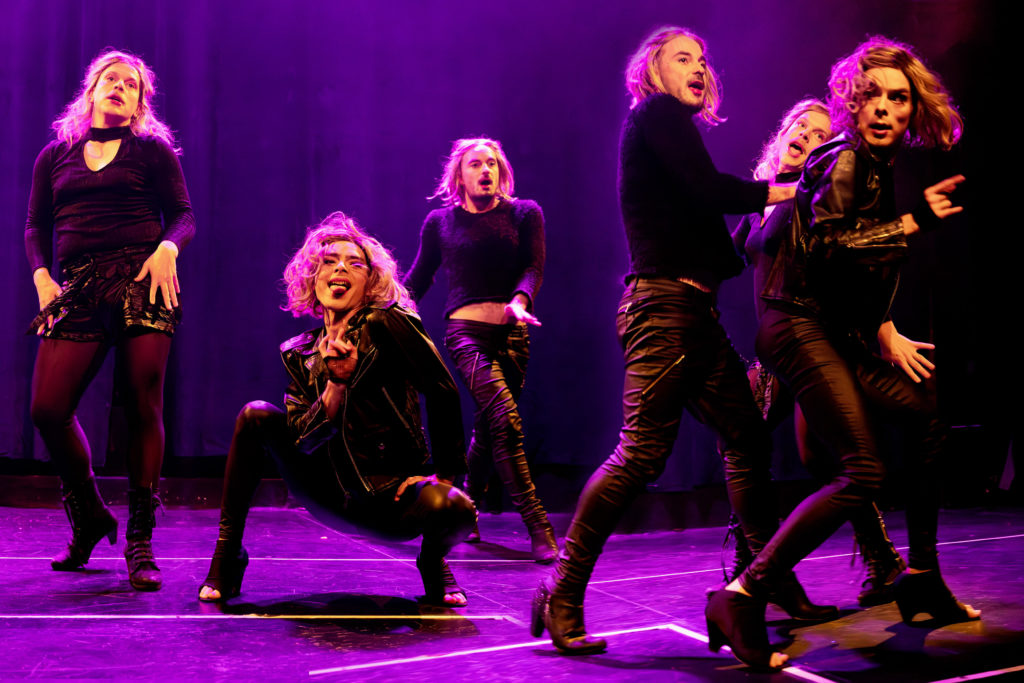

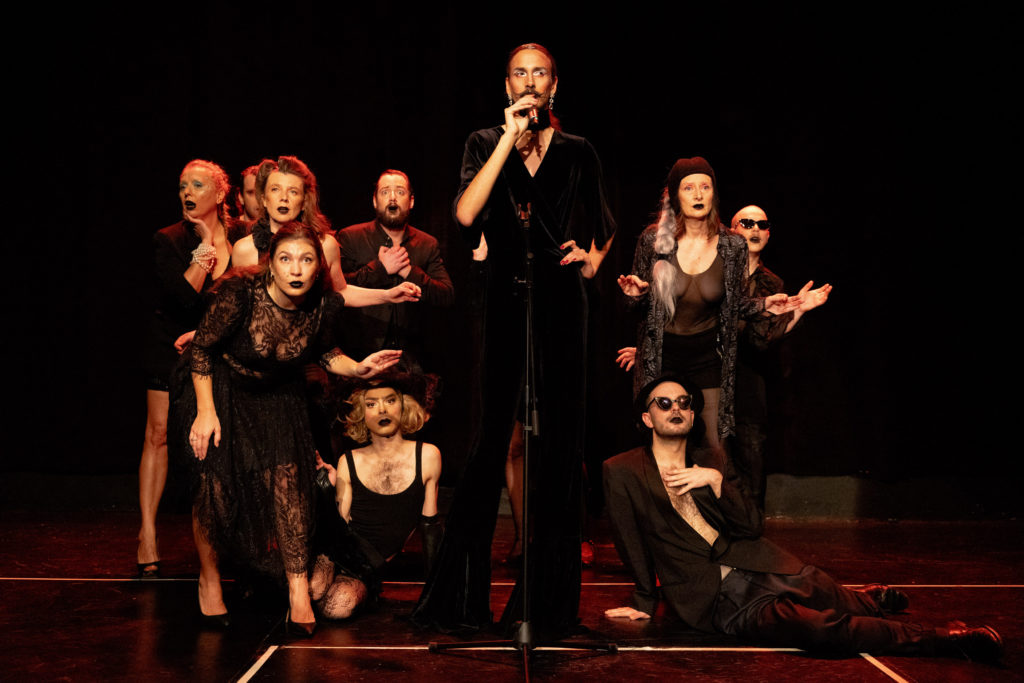
Reviews and media reactions
Because of this and because of an infinite number of other reasons, the fact that the technoburlesque Image Snatchers (still) exists is invaluable, as each time the event proves to be ultimately critical. A refreshing current in the ocean of sameness. Although it usually takes place in an alternative space (in Gromka Theatre at Metelkova) and not where it probably should have, Image Snatchers have developed a specific and unique concept that systematically and with a breadth of vision comments on and enters a critical dialogue with the deteriorated social order, questioning its (limited) meaning, undermining the dominant regimes, and countering the hegemony of collective perceptions. That the role of the theatrical community at the national level is, among other things, to challenge prejudice about sexual diversity, propagate tolerance toward minority issues, raise awareness about subcultures, and open up a safe space for free speech, is rather a fiction than actuality. Image Snatchers are an exception to the rule. They prove the existence of a marginal community, unburdened with mainstream “ethical laws”, which is refused entry into the dominant structures (national theatres included) by these structures themselves and thus prevented to give emancipated voice to minority viewpoints.
Image Snatchers draw from two sources: the topical (social) issues and self-irony.
Dialogi Journal, Technoburlesque Image Snatchers: Paradox of efficient eecycling and necessity of body liberation, Zala Dobovšek
25.05.2014, Tea Hvala: Working on Gender: New Burlesque and Cabaret in Ljubljana, in Performative Gestures Political Moves, City of Women / Red Athena University Press, 2014
The collective Feminalz has been creating the technoburlesque Tatovi Podob for almost a decade and with it has entered the space of Slovenian contemporary performing arts as one of the few that systematically cultivates and develops the genres of burlesque and cabaret. The mosaic of different performative points through appropriation, recycling and pop references (among others) explores the boundaries of burlesque and sovereignly treads the paths of the theater of discomfort, through which humor and dynamics full of action are developed, which, without the pretensions of great art, become key factors in the artistic pursuit of healthy and free society. /…/
It is the universality of the images that the collective creates in punch line structures and attaches to the current social reality that becomes their greatest rebellious potential, because the fact that they can recycle their critical considerations every time reminds us of the staleness of our space. This is also helped by the more elaborate wheel of atypical burlesque, with which the collective plays with each performance. The author’s poetics of the collective as a whole is thus becoming more and more defined and refined, while at the same time it manages to preserve the playfulness, wildness and self-irony that are their key characteristics. The dramaturgical sequence of points in this performance takes us through almost all outposts of modern man’s problems. Performers “drink each other’s blood” on stage, rap about capitalism, address general apathy and expose consumerism, they package everything together in a comic and music-dance perfect overall image, in which they skillfully ensure that they never descend to the level of didacticism and moralizing. Thus, at a time when everyone seems to be munching on their own delicacy of preaching, the collective once again succeeds in taking the audience through the cabaret party to the key reminders in a Brechtian way, while letting their interpretation and contextualization take place in the receiver rather than on stage. /…/
20.6.2022, Delo, Ocenjujemo, Gledališče, Feminalz – Tatovi podob, Benjamin Zajc

Tehnoburleska Tatovi podob
Tehnoburleska je nema komedija telesa, ki parodira okorelost družbenih vlog. Nekritično si prisvaja, kopira in lepi ženstvenost, moškost, družinska razmerja, mačizem in druge izprijene družbene vloge, ki po krivem veljajo za normativne. Ko se Tatovi povsem razgalijo, ter sloj za slojem odvržejo družbene preobleke, ne pridejo do bistva, temveč ugotovijo, da je bistvo ništrc, uprizorjene travestije telesa pa so opij, ki dela bivanje znosno. Ta zabavna igra v preoblačenju in njihovo vedenje je rezultat velike zgodovinske osvoboditve seksualnosti in teles posameznikov od družbenih spon. Zadovoljni v eklektičnem hrupu medijskega podobja raztegujejo popularne posnetke in jih zgrizejo do nezaslišanih oblik, ki zbujajo krohot ali obup. Tatovi podob ne iščejo smisla, temveč užitek. Kajti užitek je hedonistično loščilo, s katerim so premazali vsakdanje predmete in iz njih napravili nekaj izjemnega. Tehnoburleska s fizičnimi in čustvenimi telesi spreminja programsko kodo v družbi, ki končno dopušča odprto šifriranje lastnih omejenih neumnosti.
“Prepredena sem z ambivalentostjo. Sem oboje, pravilo in izjema, zakon in izobčenec, doktor in histeričarka, ne morem biti eno brez drugega. Ne zavračam podob, ki me konzumirajo. Postanem te podobe.” (Mady Schutzman)
Ustvarjalci in izvajalci:
The Feminalz: Crucial Pink, Mad Jakale, Mathilde Buns, Tristan Bargeld, H.P.D. (hormonal perturbator in decay), Cica-San, Rosa Dolor, Rebellious Controversy, Poppy Hopps, Dee Dee Void, Ariela, GlitterAid, Musée-Cunt, Belinda, Gospod Magdalenca, Frau Strapatz, Mademoiselle SatisfaireVazelina, Številka Ena, Boccaccio
Gosti: Liberty Brokeheart, Aphra Tesla Operating System, Shiva the Godess of Gandja, Maud Otis, Virgin Mary, Freddie Cankar, Mama Mila, Anja Bezlova, RotoGambrinus
Kostumografija: Urška Recer, Matic Hrovat, Tanja Pađan/Kiss the Future
Oblikovanje maske in frizur: Tina Prpar
Izbor in originalna glasba: Luka Prinčič in The Feminalz
Oblikovanje svetlobe: Janko Oven, Aljaž Zaletel, Urška Vohar, Dan Zrimšek
Video: The Feminalz in Luka Prinčič
Besedila: Saša Rakef, Frau Strapatz, Ariela, Dee Dee Void, Gospod Magdalenca in The Feminalz
Oblikovanje: Saša Kerkoš
Produkcija: Emanat
V sodelovanju: Klub Gromka, Maska, Kino Šiška, Mladinsko Theater
Zahvala: Zavod Projekt Atol
Finančna podpora: Ministrstvo za kulturo RS, Mestna občina Ljubljana
